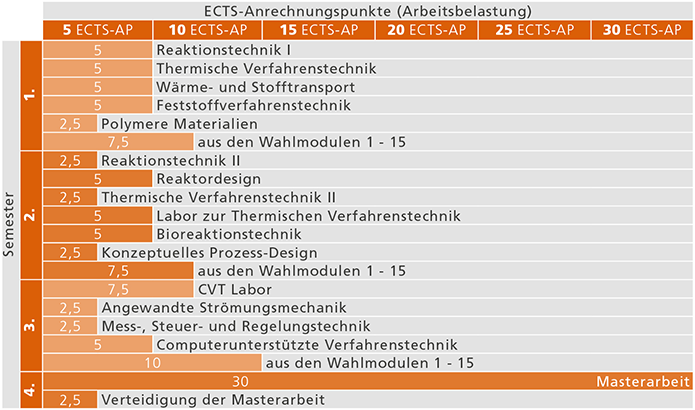Masterstudium Chemieingenieurwissenschaften
Ab dem Wintersemester 2025/2026 darf eine Zulassung zu diesem Studium nur nach dem neuen Curriculum erfolgen.
Curriculum (2019W)
Diplom-Ingenieurin/Diplom-Ingenieur (Dipl.-Ing. oder DI)
Dauer / ECTS-AP
4 Semester / 120 ECTS-AP
Studienart
Vollzeit
Sprache
Deutsch
Voraussetzung
Fachlich infrage kommendes Bachelorstudium oder Äquivalent und Sprachnachweis
Fakultät
Fakultät für Chemie und Pharmazie
Niveau der Qualifikation
Master (2. Studienzyklus)
ISCED-11: Stufe 7, EQR/NQR: Stufe 7
ISCED-F
0711Chemie und Verfahrenstechnik
Studienkennzahl
UC 066 654
Das Curriculum ist die Grundlage eines Studiums. Mit einem Blick auf das Curriculum zum Master Chemieingenieurwissenschaften erhältst du einen detaillierten Überblick zu Aufbau, Inhalt, Prüfungsordnung und Qualifikationsprofil dieses Masters.
Durch das Curriculum können mehrere wichtige Fragen bereits vor Studienbeginn geklärt werden. Zum Beispiel welche Kriterien für die Anmeldung zum Masterstudium Chemieingenieurwissenschaften erfüllt werden müssen, wie lange das Studium dauert, welche Module zu absolvieren sind und vieles mehr.
Für das Masterstudium Chemieingenieurwissenschaften gilt aktuell das Curriculum 2019W.
Informationen zum Curriculum (2019W)
Die Gesamtfassung des Curriculums spiegelt das aktuell gültige Curriculum wider, ist rechtlich unverbindlich und dient lediglich der Information. Die rechtlich verbindliche Form des Curriculums inkl. etwaiger Änderungen finden Sie in den entsprechenden Mitteilungsblättern.
Die Information, welche Curriculumsversion für Sie gilt, entnehmen Sie bitte Ihrem Studienblatt
abrufbar unter: https://lfuonline.uibk.ac.at/public/lfuonline_meinestudien.studienblatt
Spalte: Curriculum in der geltenden Fassung
- Curriculum/Gesamtfassung (ab 02.07.2025)
- Mitteilungsblatt vom 02.07.2025, 84. Stück, Nr. 741 (Berichtigung des Curriculums)
- Curriculum/Gesamtfassung (ab 01.10.2019)
- Mitteilungsblatt vom 28.06.2019, 66. Stück, Nr. 579 (Änderung des Curriculums)
- Mitteilungsblatt vom 05.04.2019, 27. Stück, Nr. 374
Voraussetzung
Fachlich infrage kommendes Bachelorstudium an der Universität Innsbruck:
Nachweis der Allgemeinen Universitätsreife:
Die allgemeine Universitätsreife für die Zulassung zu einem Masterstudium ist durch den Abschluss eines fachlich in Frage kommenden Bachelorstudiums, eines anderen fachlich in Frage kommenden Studiums mindestens desselben hochschulischen Bildungsniveaus an einer anerkannten inländischen oder ausländischen postsekundären Bildungseinrichtung oder eines im Curriculum des Masterstudiums definierten Studiums nachzuweisen. Zum Ausgleich wesentlicher fachlicher Unterschiede können Ergänzungsprüfungen (maximal 30 ECTS-AP) vorgeschrieben werden, die bis zum Ende des zweiten Semesters des Masterstudiums abzulegen sind. Das Rektorat kann festlegen, welche dieser Ergänzungsprüfungen Voraussetzung für die Ablegung von im Curriculum des Masterstudiums vorgesehenen Prüfungen sind.
Im Zuge des Nachweises der Allgemeinen Universitätsreife wird jedenfalls die Absolvierung folgender Kernbereiche im Rahmen des abgeschlossenen Bachelorstudiums geprüft:
- 10 ECTS-AP aus dem Kernbereich Mathematik/Physik
- 20 ECTS-AP aus dem Kernbereich Allgemeine Chemie/Anorganische Chemie
- 10 ECTS-AP aus dem Kernbereich Analytische Chemie
- 20 ECTS-AP aus dem Kernbereich Organische Chemie
- 20 ECTS-AP aus dem Kernbereich Physikalische Chemie
- 15 ECTS-AP aus dem Kernbereich Biochemie/Makromulekulare Chemie/Theoretische Chemie
| Semester | ECTS-AP | Titel |
|---|---|---|
Empfohlener Studienverlauf
Der unten angeführte, exemplarische Studienverlauf gilt als Empfehlung für Vollzeitstudierende, die das Studium im Wintersemester beginnen. Die Aufstellung dient der Darstellung eines möglichen Studienablaufs und ist nicht verpflichtend. Etwaige Prüfungswiederholungen bzw. deren studienzeitverzögernde Wirkung sind nicht berücksichtigt.
Die Regelstudienzeit beträgt 4 Semester bzw. 120 ECTS-AP, wobei gemäß Universitätsgesetz die Arbeitsbelastung eines Studienjahres 1.500 (Echt-)Stunden zu betragen hat und dieser Arbeitsbelastung 60 Anrechnungspunkte zugeteilt werden (ein ECTS-Anrechnungspunkt entspricht einer Arbeitsbelastung der Studierenden von 25 Stunden).
5,0 ECTS-AP: Reaktionstechnik I
5,0 ECTS-AP: Thermische Verfahrenstechnik
5,0 ECTS-AP: Wärme- und Stofftransport
5,0 ECTS-AP: Feststoffverfahrenstechnik
2,5 ECTS-AP: Polymere Materialien
7,5 ECTS-AP: aus den Wahlmodulen 1 - 15
2,5 ECTS-AP: Reaktionstechnik II
5,0 ECTS-AP: Reaktordesign
2,5 ECTS-AP: Thermische Verfahrenstechnik II
5,0 ECTS-AP: Labor zur Thermischen Verfahrenstechnik
5,0 ECTS-AP: Bioreaktionstechnik
2,5 ECTS-AP: Konzeptuelles Prozess-Design
7,5 ECTS-AP: aus den Wahlmodulen 1 - 15
7,5 ECTS-AP: CVT Labor
2,5 ECTS-AP: Angewandte Strömungsmechanik
2,5 ECTS-AP: Mess-, Steuer- und Regelungstechnik
5,0 ECTS-AP: Computerunterstützte Verfahrenstechnik
10,0 ECTS-AP: aus den Wahlmodulen 1 - 15
30,0 ECTS-AP: Masterarbeit
2,5 ECTS-AP: Verteidigung der Masterarbeit

Erweiterung des Studiums
Im Rahmen dieses Studiums kann das Erweiterungsstudium Entrepreneurship im Umfang von 45 ECTS-AP oder das Erweiterungsstudium Informatik im Umfang von 60 ECTS-AP absolviert werden. Die Zulassung zur Erweiterung setzt die Zulassung zu einem oder den bereits erfolgten Abschluss eines ausgewählten Studiums voraus. Weitere Informationen sind abrufbar unter:
Informationen zur Prüfungsordnung inkl. Bewertung und Benotung
Prüfungsordnung
Die Prüfungsordnung ist integraler Bestandteil des Curriculums, detaillierte Informationen finden Sie unter dem Paragrafen Prüfungsordnung.
Bei der Notenverteilungsskala handelt es sich um die statistische Darstellung der Verteilung aller positiv absolvierten Prüfungen, die innerhalb eines Studiums bzw. eines Studienfaches (unter Heranziehung aller gemeldeten Studierenden eines Studiums bzw. eines Studienfaches) erfasst wurden. Die Notenverteilungsskala wird in regelmäßigen Abständen aktualisiert.
| Österreichische Notenskala | Definition | %-Satz | ||
| 1 | SEHR GUT | 47,7 | = 100% | |
| 2 | GUT | 33,3 | ||
| 3 | BEFRIEDIGEND | 11,9 | ||
| 4 | GENÜGEND | 7,1 | ||
| 5 | NICHT GENÜGEND |
März 2025
Gesamtbeurteilung der Qualifikation
Nicht zutreffend
Erklärung: Eine Gesamtbeurteilung (mit Auszeichnung bestanden, bestanden, nicht bestanden) wird nur über eine studienabschließende Prüfung, die aus mehr als einem Fach besteht, vergeben (im Curriculum dieses Studiums ist diese nicht vorgesehen).
Formulare
- Prüfungsprotokoll
- Anmeldung der Masterarbeit (inklusive Exposè)
- Beurteilung des Pflichtmoduls: Vorbereitung Masterarbeit
- Deckblatt der Masterarbeit
- Ansuchen um Anerkennung von PrüfungenUNDBeiblatt
- Antrag um Zulassung zur dritten und vierten Wiederholung einer Lehrveranstaltungsprüfung
Formulare und Ablauf der Einreichung der Masterarbeit (gültig seit 01.11.2023)
Kontakt und Information
Prüfungsreferat
Standort Innrain 52d
Studienbeauftragter (ab 01.08.2024)
Univ.-Prof. Dipl.-Chem. Dr. Oliver Ingolf Strube
Studiendekan
Assoz. Prof. Dr. Thomas Müller
